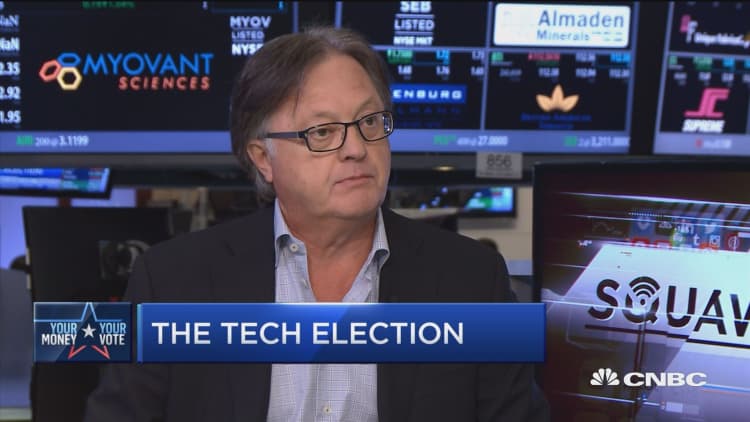
The 2016 U.S. presidential campaigns have "blown up" Americans' trust in institutions such as capitalism — and that does not bode well for the technology industry, two investors said.
"The thing investors really need to pay attention to is less about what candidates say, than about what this process implies for the future, in terms of uncertainty," Roger McNamee, co-founder of tech investment firm Elevation Partners, told CNBC's "Squawk Alley" on Monday. "I think that investors have gotten used to the idea that the U.S. has stable institutions — that we can count on the banking system, that we can count on the government, in general, to stay predictable within certain ranges. I think that this campaign has blown all of that up."
This year's presidential hopefuls have run a wide gamut on economic issues, with Donald Trump's business background and Bernie Sanders' stance as a social democrat. But even amidst disparate political stances, a common theme was that of "outsiders" from the political mainstream. Meanwhile, trust in government is at the lowest in the past half-century, Pew Research Center has found.
"Lost of trust, loss of empathy are everywhere in the economy right now," McNamee said. "It makes me just generally more cautious. I believe that Silicon Valley, and our economy, can still produce a lot of greatness. But what I worry about is that the benefits of that have been so unevenly distributed for so long, that a lot of ideas are going to get killed too early, simply because we haven't been smart and shared the benefits broadly. The economy's just gotten out of track."
Eric Hippeau, a partner at Lerer Hippeau Ventures, cited a Harvard University survey which found that 51 percent of millennials "reject capitalism."
"I'm concerned about the attack in general on private enterprise and capitalism," Hippeau said. "We are raising a whole generation of people who believe that capitalism is a bad thing. Together with that comes more regulation, more government interference, and that is not good for innovation. Innovation needs to be free. Play within the rules, but the rules need to be well known and stay there for the long term."
On the Republican side, Trump has escalated his stance as an "outsider" much further, saying repeatedly that the electoral system is "rigged."
I don't think it matters what we do in Silicon Valley at this point. We've got to fix those institutions or we're in big trouble.Roger McNameeCo-founder of Elevation Partners
"There are so many exciting things to invest in right now, like climate change technology. Like various forms of information technology. Medical technology," McNamee said. "But people are not going to do that if they believe there is a risk of somebody getting in there and blowing up the system, either through Congress or through the presidency or in the streets."
It comes after Obama's term has seen intense gridlock between Democrats and Republicans in Congress.
"I think there were issues already under Obama, because of the Republican obstruction of his legislative agenda," McNamee said. "But I think now you're in open warfare. And I think that's really bad for the investment markets in general. I think it raises capital costs everywhere.... I don't think it matters what we do in Silicon Valley at this pointe. We've got to fix those institutions or we're in big trouble."
Technology, including internet platforms like Twitter, have played an increasingly important role in the campaign process, McNamee said. But that hasn't been reflected in the debates from candidates, Hippeau said.
"We haven't heard much about the future in these debates," Hippeau said. "We've heard about an economy that's going to have high tariffs. That we're going to bring manufacturing back — I'm assuming they mean the old-style manufacturing. We haven't really talked about technology, innovation — the drivers of the economy today have been completely lost."


